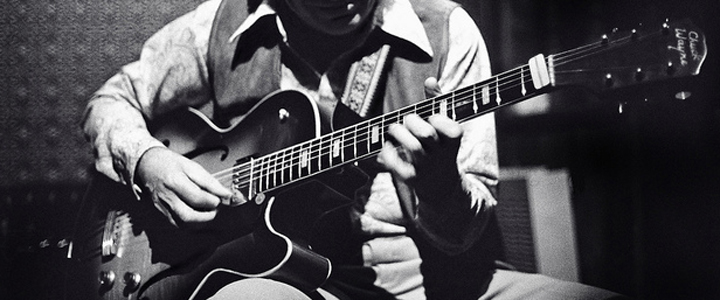Most guitarists I know, myself included, have a fairly large collection of guitar books and teaching methods, and if you grew up in the video tape era you probably have an extensive collection of REH videos too. A good guitar book can provide years of insight as long as you’re willing to turn those morsels of carefully crafted information into knowledge by putting the work in… And as most guitar-book connoisseurs know, these tomes of information fall into two basic categories: those books that show you a bunch of patterns and/or licks with backing tracks, and those that actually teach you something by means of a tried and tested method. Enter Jeari Czapla whose book, Opus One for the Apprenticing Guitarist, definitely falls into the latter category. Jeari was kind enough to talk to us about Opus One, its origins and the method itself.
Matt: Tell us a little about how the Opus One guitar curriculum came about.
Jeari: Great Question, Opus One initially came out of a personal need to learn a bunch of guitar stuff in a short period of time. After buying and reading tons of popular guitar books, I saw that there was a lacking in Guitar Book instruction between Scale Patterns and Chord relationships.
I spent hundreds of my hard earned dollars trying to learn from some of those books with very little to no real positive results.
It was during my second year (of 4) studying guitar with Chet Breau in Winnipeg in 1988. Chet gave me some photocopies of five scale patterns his dad Lenny had given him at GIT (Guitar Institute Technology, now known as MI – Musicians Institute). Chet said I needed to know all five patterns in all keys—and the sooner the better. With my great work ethic and determination, I became Chet’s prodigy.
I had lots to remember, so I started drawing in red pen on blank white paper all the scales I needed to remember. I drew the scale, arpeggio, and chord all on one page so I could remember their relationship easier. I drew three major scales a week and studied those for my next private lesson with Chet. Given there are 12 major scales I figured it would take me 4 weeks to get them all done.
Then I realized there are 12 minor scales, 12 harmonic minor, 12 melodic minor and the list kept on going to include all the modes. My Friends thought I was crazy, but I just wanted to know as much as I could.
Back then, in between my guitar lessons, I would get on the bus and go downtown to Tredwell’s Music Store to read music books, and after all the books I read. I noticed that not one book wrote out the scales, arpeggios and chords the way I did. Today, I still can’t find a book that makes it so easy to learn so much so quickly.
So that’s how Opus One came about. I was actually doing it to benefit myself.
One day in 1994 while I was finishing music college at Grant MacEwan in Edmonton (during what I call, “The Apartment Days”), my girlfriend Corinne, who is now my wife of 21 years said to me: “Why don’t you write a Guitar Book? You know everyone else has one, and you’re the only one that doesn’t.”
She tricked me good (laughs), because nobody else I knew had one.
Shortly after that Corinne and I bought our first computer, an IBM Aptiva (with 8 Mb of RAM!) and I started writing out my concept for my guitar book on that computer, which I still own, only now it’s a glorified CD player in our garage.
At first I didn’t have any music notation software to make musical notation easier – I had a program called Aldus PageMaker. Pagemaker is graphic design and layout software, so not really for music notation. I had to draw each note including the stems and circles for whole, half, quarter, and so on plus their flags. This took many late-night hours because there was a huge learning curve with the software.
However, nothing could have prepared me for the pure emotion I felt when I printed out the first page. I was proud and suddenly realized Opus One was possible.
Matt: Tell us about your background as a player, how you got into playing guitar, and who your biggest influences are.
Jeari: Wow, your questions get right to the point! (laughs) That’s great!
I was six years old when my dad borrowed a family member’s acoustic guitar for the weekend. While that guitar was home my dad showed me the only three chords he knew (E Major, A Major, and D Major), I was hooked.
I would have to say the earliest influence was my dad, but with the three chords he showed me I learned so much more. I began listening to the radio differently, mind you; most of that of early stuff Dad taught me was ‘Surf Music’, and general music from the early ‘60s. My younger sister Tammy was a big ‘Police’ fan and listened to them non-stop. I was also playing drums at the time which I did for 12 years. I played music from the Rock ‘n’ Roll style of Buddy Holly, The Beatles, Stones, Kiss, and any other rock music I could find to listen to. One day, I decided I wanted to learn from a professional guitar instructor. So, I walked into a large Winnipeg music store chain and asked them who the best guitar instructor in town was. They said Chet Breau and soon enough I was totally digging Jazz. Of course, Lenny Breau, George Benson, and Pat Methney became huge influences on my playing along with rock guitarists like Kim Mitchell, Alex Lifeson, and Van Halen. Blues guitarists like Roy Buchanan, Albert King, and Stevie Ray Vaughan, and country pickers like Jerry Reed, Merle Travis, Marty Stuart, and Chet Atkins all influenced me. Also, there are so many local players I find so inspiring and influential.
Whew, sorry man, that was long winded. I had to take a break just to breathe, (laughs).
Matt: What kind of guitar player, in terms of level and prior knowledge, would you say Opus One is aimed at?
Jeari: Opus One Guitar Curriculum is suitable for beginner to advanced students of all ages. The book is organized in a weekly lesson plans so all you have to do is follow the lesson plan. Each weekly lesson includes theory, ear training, and guitar techniques directed at improving the apprenticing guitarist quickly.
Opus One is a workbook, making the practical written exercises and exams a great way for students to benchmark their progress and success, and they also help instructors easily facilitate the entire learning process. So, the methodology is actually great for instructors as well.
Opus One is directly aimed at the player who wants to get better regardless of age.
Matt: Tell us a little about the methodology of Opus One. I think one of the main strengths of the book is that it teaches actual music theory as it relates to the guitar, unlike a lot of other books which just give you a bunch of patterns and licks to learn.
Jeari: Thank you, you put it perfectly… Opus One teaches actual music theory as it relates to the guitar. As I said earlier, Opus One Guitar Curriculum came about from practical circumstances – I needed to figure out a method for me to learn guitar fast!
Either as a self-study or with a private instructor, Opus One covers the first year of any music college or University Music Program. So even if you don’t go to a secondary education for music you have the same education as someone who attends one of those music programs, and you just saved money on your first year tuition.
You nailed it, a lot of other books just give you patterns and send you off on your own to figure out how to use the scale, arpeggio, or even chord voicing. I focused on making sure when I provided information that a student could use that information immediately in their songs.
Independent and Creative Thinking are critical for players, and Opus One provides that for students.
Matt: I liked the academic but dynamic layout of Opus One. Do you need a teacher to work through the book, or does it also lend itself well to self-study?
Jeari: You got it, younger students between 6 to 10 years of age may need some help to get through the book but basically everyone can go through it on their own. Having a private instructor help out is always a great idea. I wrote it so anyone could use it.
Over the years, I have had so many ‘Schools of Music’ purchase hundreds of copies of Opus One to use as their school guitar curriculum. Those schools would then hire me to do a brief presentation seminar explaining the potential of the book to the instructors.
Keeping a musical journal is a great way to watch your progression and complete your short term and long-term goals fast. There is a great ‘Practice Schedule’ at the back that I highly recommend students use daily and monthly.
Matt: Opus One covers a lot of ground in just nine weeks. What would you say are the other strengths of the book as a guitar instruction manual?
Jeari: Opus One does cover a lot of ground in nine weeks. On the other hand, a person could study at their own speed by re-reading portions to solidify their information.
What separates Opus One from other guitar books is a great question. Certainly when I think about what’s really great about Opus One I’m reminded of the scale, arpeggio, and chord relationship, the 4 progressive chord charts, the exams, the practice schedule, the ear training, the direct theory application to the instrument, and all the important information that a player needs to get playing immediately.
Opus One is now celebrating its 20th, year in publication this year and I have done everything from compiling the information, editing, graphic designing, publishing, promoting, marketing, and sales. I have done my due diligence, and all the research I need to completely understand how to make this book like none other. I totally believe in this book.
Matt: I can see Opus One being very useful for anyone thinking about going to Music College, or even to supplement their studies while there. Who else would you say could benefit from studying from this book?
Jeari: Opus One will benefit anyone who picks it up and reads it just once. Vocalists, piano players, saxophone players, and any other instrumentalists that are looking to explain their musical own ideas and get a different perspective.
As a guitarist, I have bought saxophone books to help expand my soloing possibilities. After all, horn players can’t play more than one note at a time and spend much of their time concentrating on developing nice melodic lines. I’ve learned famous piano lines, violin, and horn lines and added them to my own set of soloing lines.
So anyone who picks up Opus One will get something from it because it’s that chalk full of good useful positive information.
Matt: Finally, for anyone interested in picking up a copy of Opus One, where is it available?
Jeari: You can buy it for $40.00 directly from our company online at czaplamusic.com or if you live in Canada you can buy it from one of the 56 Long & McQuade Stores nationwide.
Yeah, it’s nice to have a major music store in Canada get behind your book. We tried the two popular American book publishers but because I’m Canadian, they weren’t interested in publishing or promoting Opus One. So likewise, I stopped promoting them.
When I teach, I use nothing but Opus One. Why? Because it has everything I need all in one book. If there are readers out there that would like to get their ‘School of Music’ to use it, contact us online and we can help.
Thank you for taking the time to speak with me today, and for your interest in our popular Guitar Curriculum Opus One. You sure know how to, ‘Create an Awesome Day’.
Matt: Our pleasure Jeari, great to have you on the blog, and we wish you continued success with what is definitely a very useful guitar book.
Connect with Jeari on Twitter and Facebook.




What a great Interview,.. ThanQ.